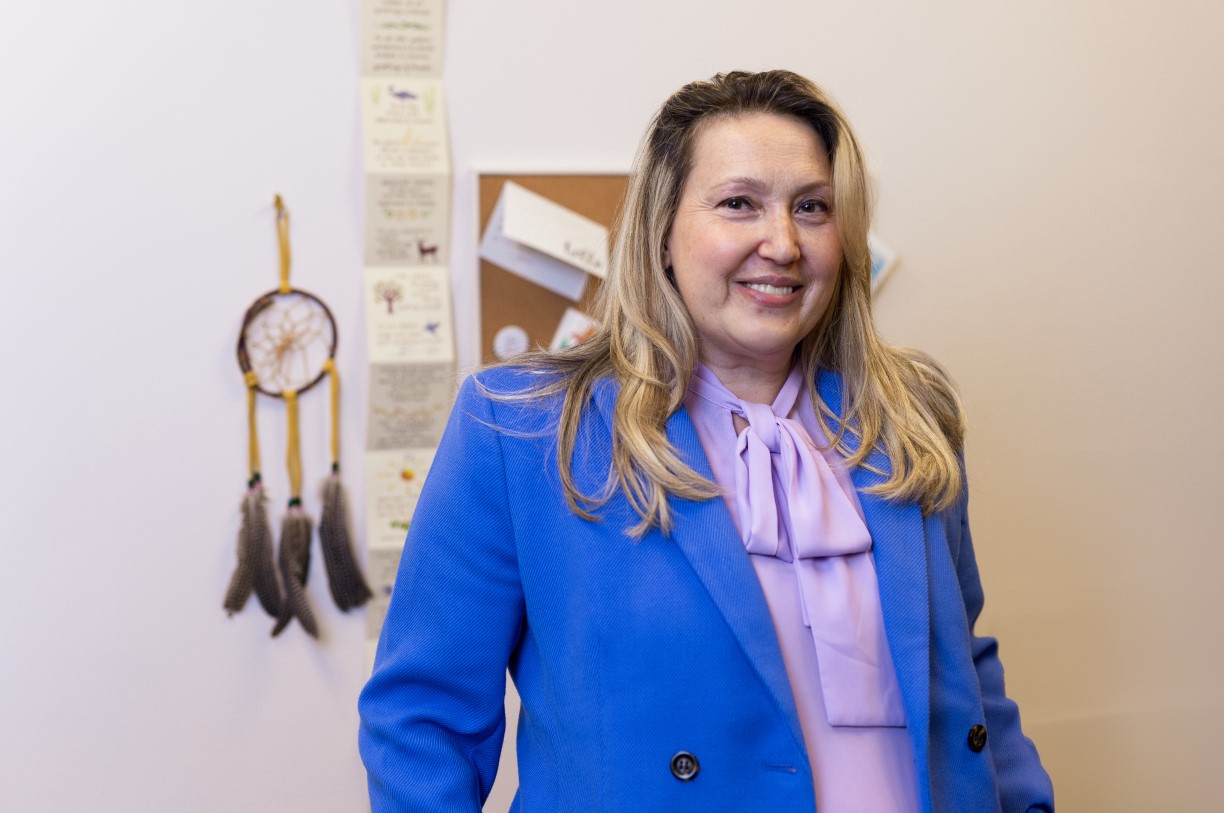
Helping Professors Cultivate Inclusive Classrooms
As a member of the university’s Learning Design team, Georgia Madway helps Bentley faculty develop enriching and engaging course materials that enhance student learning. She specializes in inclusive pedagogy, an educational approach that acknowledges and responds to differences among students’ backgrounds, learning styles and life experiences to ensure that classroom experiences are relevant and accessible for all learners.
In addition to co-leading the university’s new Inclusive Teaching Fellows Initiative, Madway serves as co-chair of the Indigenous Education Steering Committee, a group established last spring to help Bentley identify ways to honor and elevate Indigenous voices and perspectives. We recently caught up with her to learn more about her efforts to foster inclusive and welcoming spaces for all members of the Bentley community.
Q: What is inclusive pedagogy and why is it important for Bentley and other higher education institutions to engage in its practice?
A: As a philosophy, inclusive pedagogy encompasses a variety of practices and perspectives, so there’s no single, agreed-upon definition. I personally define it as a discipline or teaching methodology that recognizes the rights of all students to a learning experience that respects diversity, enables participation, removes barriers and anticipates and considers a variety of learning needs and preferences. This approach recognizes that differences enrich our learning community and strives to create a space where students feel they can bring their “whole selves” to the classroom.
For me, bell hooks — the trailblazing feminist, educator and author — says it best: “To begin, the professor must genuinely value everyone’s presence. There must be an ongoing recognition that everyone influences the classroom dynamic, that everyone contributes. These contributions are resources. Used constructively they enhance the capacity of any class to create an open learning community.”
As higher education institutions now serve increasingly diverse student populations in terms of race, ethnicity, gender orientation, age, socioeconomic status, ability and more, it’s vital to adopt more inclusive teaching practices. Doing so sends a strong message that all students are valued and respected — which, in turn, helps build a sense of belonging and community and reduces the chance of students feeling marginalized or excluded. Inclusive classrooms also prepare students for a more globalized world where understanding and respecting differences is essential.
Q: Tell me more about the Inclusive Teaching Fellows Initiative, which you co-lead with Erin Kelley, associate dean of Assurance of Learning and Accreditation. How will this program benefit Bentley students, faculty and the broader campus community?
A: Among all members of the campus community, faculty spend the most time with students — and therefore play a pivotal role in dismantling learning barriers and creating fair and just learning environments. The Inclusive Teaching Fellows Initiative, which is sponsored by the Office of the Provost in partnership with the Badavas Center for Innovation in Teaching and Learning, Bentley’s Wilder Teaching Professors and our Learning Design team, provides a dedicated space where faculty from various disciplines can come together and learn how to create more equitable and welcoming classroom experiences.
 For our first cohort, which began meeting in October, Erin and I have focused on the five fundamental principles of inclusive teaching [see graphic, right]. We’ve also explored strategies that support these principles — for example, how to create spaces of belonging in the classroom and the importance of developing reading lists, case studies and other course materials that reflect the perspectives of historically marginalized or undervalued groups.
For our first cohort, which began meeting in October, Erin and I have focused on the five fundamental principles of inclusive teaching [see graphic, right]. We’ve also explored strategies that support these principles — for example, how to create spaces of belonging in the classroom and the importance of developing reading lists, case studies and other course materials that reflect the perspectives of historically marginalized or undervalued groups.
Our goal is to help Bentley faculty feel more confident and competent about identifying and implementing strategies for engaging a wider variety of learners; at the end of the day, faculty who teach inclusively increase learning outcomes while creating the conditions for overall student success. We’re really excited about further iterations of this initiative and future cohorts.
Q: You and Patrick Couillard Hale, director of Bentley’s Office of Diversity and Inclusion, serve as co-chairs of the newly formed Indigenous Education Steering Committee. How will this group help Bentley honor and elevate Indigenous voices and perspectives?
A: Last year, Bentley welcomed Winona LaDuke, a prominent advocate for Indigenous rights and environmental justice, to campus as the keynote speaker for its 37th annual Martin Luther King Jr. Celebration. During the event, the university introduced its first comprehensive land acknowledgement statement — which recognizes that Bentley currently occupies the unceded, ancestral homelands of the Indigenous Pawtucket and Massachusett peoples — and announced the creation of an Indigenous Education Steering Committee to help the university continue its commitment to raising awareness of and appreciation for Indigenous cultures and values.
I’m proud of the work our committee is doing to provide meaningful, reflective educational experiences that showcase Indigenous history, scholarship and cultural practices. Last month, we hosted a dialogue session during CultureFest — an annual, weeklong celebration of the cultural diversity that exists within our community — to explore Bentley’s joint recognition of Indigenous Peoples Day and Columbus Day. We’re also planning a collaborative art installation to highlight the beauty and resilience of the Native American experience as part of the MLK Day 2024 celebration in January.
In the months ahead, our committee looks forward to identifying additional ways to foster an inclusive and welcoming environment for Indigenous and Native peoples both within and beyond our campus community.

